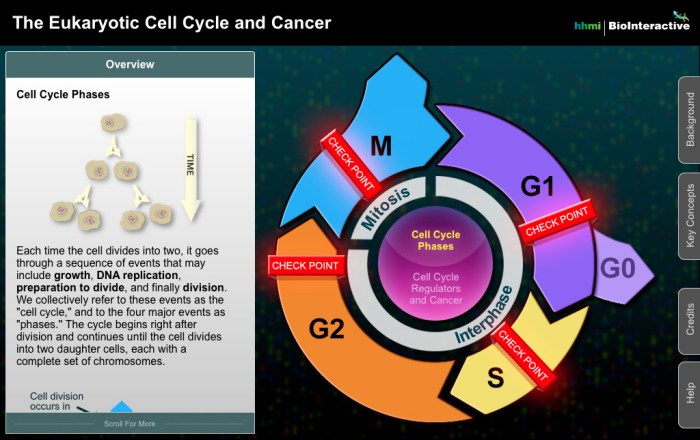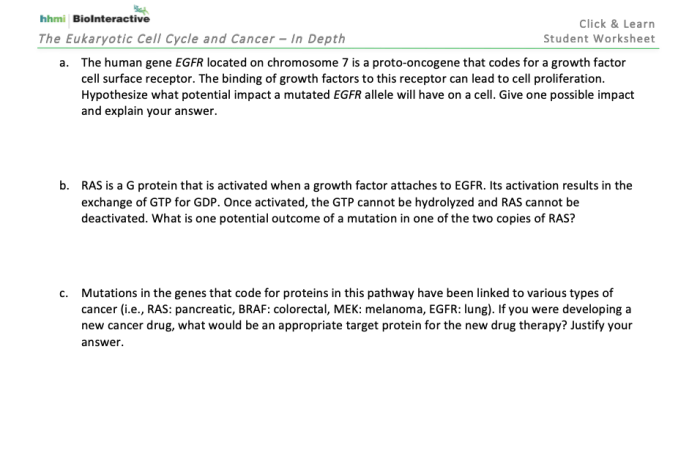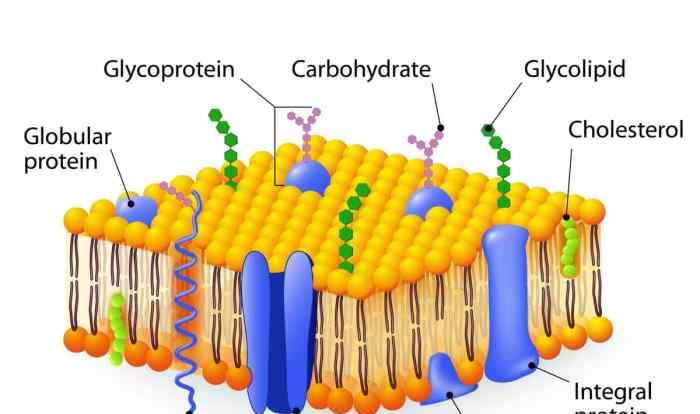Hhmi cell cycle and cancer – Unveiling the intricate relationship between the cell cycle and cancer, this article delves into the groundbreaking research conducted by HHMI. Join us as we explore how disruptions in cell division can lead to the development of various types of cancer and the challenges in targeting the cell cycle for therapeutic interventions.
From the fundamentals of the cell cycle to the latest advancements in cancer treatment, this comprehensive overview provides a deep understanding of this critical biological process and its implications for human health.
Cell Cycle Overview
The cell cycle is the ordered series of events that cells go through as they grow and divide. It consists of four distinct stages: G1, S, G2, and M. During the G1 phase, the cell grows and prepares for DNA replication.
In the S phase, the cell’s DNA is replicated. During the G2 phase, the cell checks for DNA damage and repairs any errors. Finally, in the M phase, the cell divides into two daughter cells.
Checkpoints in the Cell Cycle
The cell cycle is regulated by a series of checkpoints that ensure that the cell is ready to progress to the next stage. These checkpoints are located at the G1/S, S/G2, and G2/M transitions. If the cell is not ready to progress to the next stage, the checkpoint will halt the cell cycle until the problem is resolved.
Consequences of Cell Cycle Dysregulation
Cell cycle dysregulation can lead to a number of problems, including cancer. Cancer cells often have mutations in the genes that regulate the cell cycle, which allows them to divide uncontrollably. This uncontrolled cell division can lead to the formation of tumors.
HHMI’s Role in Cell Cycle Research: Hhmi Cell Cycle And Cancer

HHMI has been a major supporter of cell cycle research for over 30 years. HHMI investigators have made significant contributions to our understanding of the cell cycle, including the discovery of key cell cycle regulators and the development of new methods to study the cell cycle.
HHMI-funded studies that have advanced our understanding of the cell cycle
HHMI-funded studies have led to the discovery of several key cell cycle regulators, including cyclin-dependent kinases (CDKs), cyclins, and tumor suppressor proteins. These proteins play essential roles in controlling the progression of the cell cycle. HHMI investigators have also developed new methods to study the cell cycle, such as fluorescence microscopy and flow cytometry.
These methods have allowed researchers to visualize the cell cycle in real time and to measure the expression of cell cycle proteins.
The Howard Hughes Medical Institute’s research on the cell cycle and cancer has made significant strides in understanding the mechanisms underlying tumor growth. Ms. Moore’s retirement, announced recently at ms. moore plans to retire , will be a loss to the scientific community.
However, the legacy of her work and the institute’s ongoing efforts will continue to advance our knowledge of cell cycle regulation and its implications for cancer treatment.
Impact of HHMI’s research on the development of new cancer treatments
HHMI’s research on the cell cycle has had a major impact on the development of new cancer treatments. By understanding the molecular mechanisms that control the cell cycle, researchers have been able to develop drugs that target these mechanisms. These drugs have been shown to be effective in treating a variety of cancers, including leukemia, lymphoma, and breast cancer.
Cancer and the Cell Cycle
Cancer is a disease characterized by uncontrolled cell growth and division. This dysregulation of the cell cycle can occur due to mutations in genes that encode proteins involved in cell cycle control. These mutations can lead to the development of various types of cancer.
Types of Cancer Associated with Cell Cycle Abnormalities
Cell cycle abnormalities can contribute to the development of various types of cancer, including:
- Lung cancer:Mutations in the TP53gene, which encodes a tumor suppressor protein involved in cell cycle arrest and apoptosis, are commonly found in lung cancer.
- Breast cancer:Mutations in the BRCA1and BRCA2genes, which encode proteins involved in DNA repair and cell cycle checkpoints, are associated with an increased risk of breast cancer.
- Colorectal cancer:Mutations in the APCgene, which encodes a protein involved in the Wnt signaling pathway that regulates cell proliferation, are commonly found in colorectal cancer.
- Leukemia:Mutations in genes that encode proteins involved in cell cycle regulation, such as FLT3and KIT, are associated with the development of leukemia.
Challenges of Targeting the Cell Cycle in Cancer Therapy
Targeting the cell cycle in cancer therapy is a promising approach, but it faces several challenges:
- Specificity:Many cell cycle proteins are essential for normal cell function, so targeting them can lead to toxic side effects.
- Resistance:Cancer cells can develop resistance to cell cycle inhibitors, making them less effective over time.
- Redundancy:Multiple proteins can perform similar functions in the cell cycle, making it difficult to target a single protein effectively.
Future Directions in Cell Cycle Research

The field of cell cycle biology is constantly evolving, with new discoveries emerging all the time. These discoveries have the potential to lead to new treatments for cancer and other diseases.
One of the most promising areas of research is the development of new drugs that target specific cell cycle proteins. These drugs could be used to treat cancer by preventing cells from dividing and multiplying.
Another area of research is the development of new methods to detect and diagnose cancer. These methods could help doctors to identify cancer cells at an early stage, when they are more likely to be treatable.
Artificial intelligence (AI) and machine learning (ML) are also playing an increasingly important role in cell cycle research. These technologies can be used to analyze large amounts of data and identify patterns that would be difficult to find by humans alone.
AI and ML in Cell Cycle Research, Hhmi cell cycle and cancer
AI and ML are being used to develop new drugs, identify new targets for cancer therapy, and improve the accuracy of cancer diagnosis.
- Drug discovery:AI and ML can be used to screen large libraries of compounds for potential new drugs that target cell cycle proteins.
- Target identification:AI and ML can be used to identify new proteins that are involved in the cell cycle and that could be targeted by new drugs.
- Diagnosis:AI and ML can be used to develop new methods to detect and diagnose cancer by analyzing images of cells and tissues.
Essential FAQs
What is the cell cycle?
The cell cycle is a series of precisely controlled stages that cells undergo to grow, divide, and create new cells.
How can disruptions in the cell cycle lead to cancer?
When checkpoints in the cell cycle fail to function properly, cells can accumulate mutations and continue dividing uncontrollably, leading to the formation of tumors.
What are the challenges of targeting the cell cycle in cancer therapy?
Cancer cells often develop resistance to cell cycle-targeting drugs, and these drugs can also harm healthy cells that are rapidly dividing.
